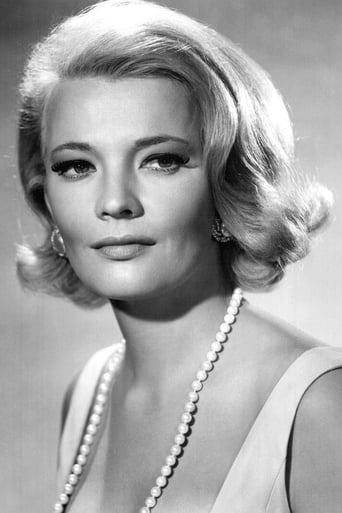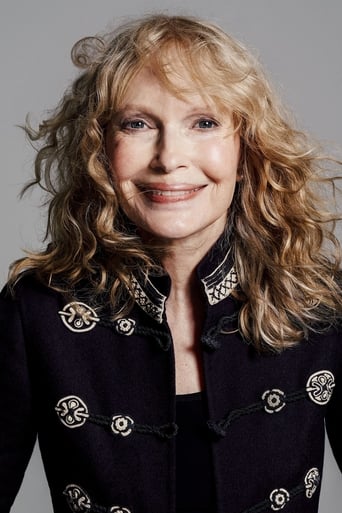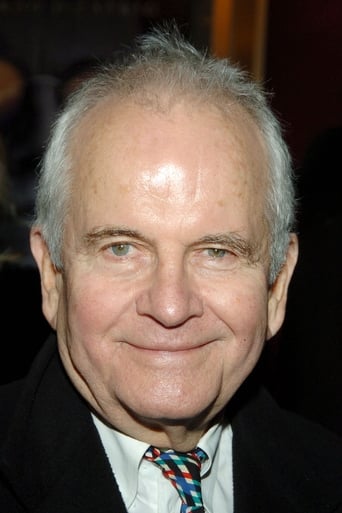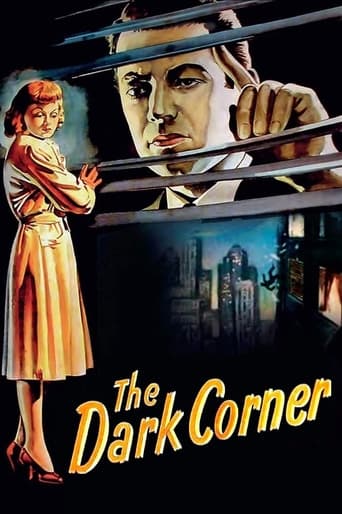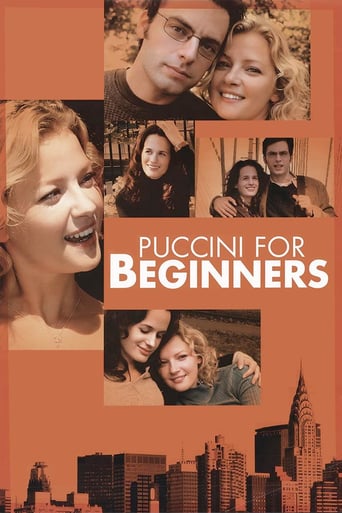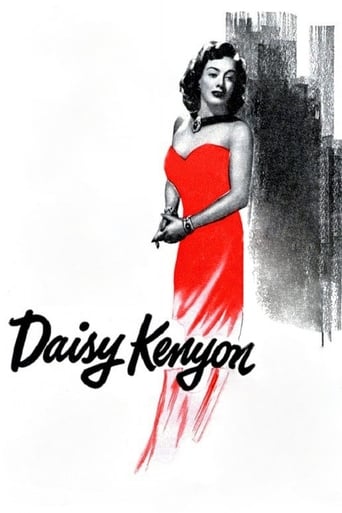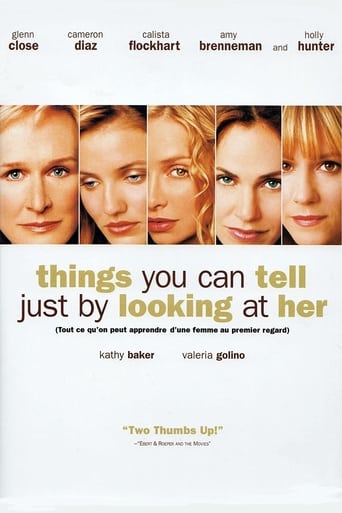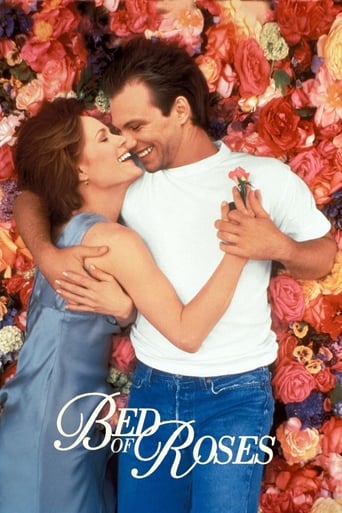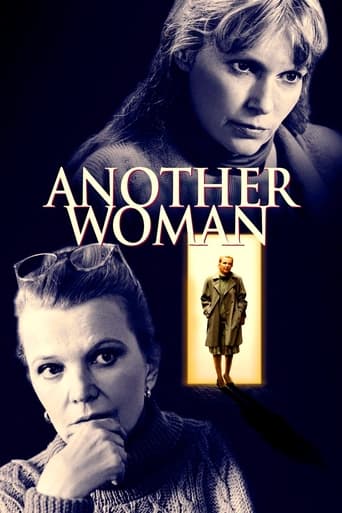
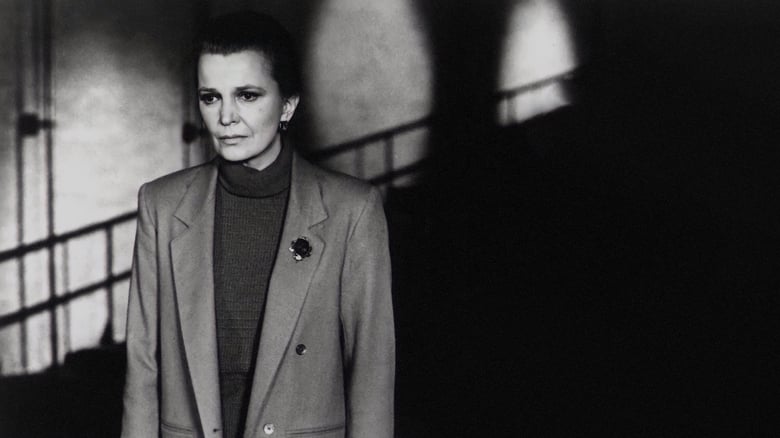
 Watch Now
Watch Now







Another Woman (1988)
 Watch Now
Watch Now







Marion is a woman who has learned to shield herself from her emotions. She rents an apartment to work undisturbed on her new book, but by some acoustic anomaly she can hear all that is said in the next apartment in which a psychiatrist holds his office. When she hears a young woman tell that she finds it harder and harder to bear her life, Marion starts to reflect on her own life. After a series of events she comes to understand how her unemotional attitude towards the people around her affected them and herself.
Watch Trailer
Cast


Similar titles
Reviews
If you don't like this, we can't be friends.
Fantastic!
Absolutely Fantastic
A lot of perfectly good film show their cards early, establish a unique premise and let the audience explore a topic at a leisurely pace, without much in terms of surprise. this film is not one of those films.
Gena Rowlands' Marion Post is only modest on the surface, but it's so beguiling that she almost does not recognise the air of superiority and disdain herself. Her opening voice-over narration has a reserved, bored quality about it that, as if she has finally found herself a place to settle down and enjoy the rest of life. Then a simple technique; the thin walls of the therapist office give way to creeping thoughts about wasted life and ambitions and futility that are mirrored in her own mind. This leads to a series of reveals that are like a thread unravelling the seemingly peace and contentment of Marion's life and relationships. It starts with a timid question with her 2nd husband whom we understand has not slept with her for quite some while. And we feel that this sort of introspection has not breached Marion's mind for a long time; she has been too haughty, too dismissive, too self centred and confident in her appearance. She has slowly eroded any sense of respect from her 1st marriage, but oh, it was only under the guise of being honest! And she is a home-wrecker too - there is that icy interruption of a gathering by the ex-wife Cathy that is reminiscent of Bergman, and it is so cold in the way that Ken shushes her emotional breakdown in the politest way. Marion sees this in her own way; not the emotional distress of Cathy, but worrying that it might someday be her in that situation (and she is eventually correct). One thing that isn't honest at all is Rowlands' performance. Her mask of genuineness is put on in almost every social gathering, but there is a hint of this stalker-like presence, as if each quietly absorbed word is being filtered through her ego. There is a brief scene at a restaurant when she is having dinner with her friends and a former student of hers confesses that she has changed her life. Rowlands' reaction is just perfect; a hint of modesty, a fluttering of the eyes, and though she is proud, there is also a semblance of shame, as if she has never ever had that sort of effect on anyone that was actually close or important to her. There are also these dream sequences that indicate her mind is filled with regret. These aren't the most subtle of Allen's scenes, but when is this emotion ever slight? Gene Hackman's Larry is the lost love, the one that got away, and there is also a wondering of what might have eventuated of an abortion borne out of an affair with a professor (and how the edit seamlessly transfers an older Marion into the worries). Two things signals her eventual change. One, how she notifies the therapist of the 'acoustic oddness' because she is no longer fretting about hearing these so familiar thoughts of pessimism. And two, the little chapter at the end from Larry, which is the first instance of a positive memory of Marion in the entire film. It offers a sweet, lovestruck perspective, as if it were not too late to start over, and that even at 50, such an emotion could be sought once more.
Gena Rowlands lives in her own world, really. She is married but is self-sufficient and, as she will soon find out, her world is coming apart. She is a very intelligent and well-educated woman but is one of those people who can't see past the end of their nose. In writing her latest book, she rents office space for quiet but is distracted by a voice confessing to a psychiatrist. She is enamored by the vulnerable and lost voice (Mia Farrow) and in the process learns about herself. In dealing with family members, her eyes are slowly beginning to open to see her own flaws and how to forgive herself and others. Gena Rowlands gives a spectacular performance in this introspective, insightful and intuitive Woody Allen film. It's beyond me why Gena was never recognized by Oscar for this film, or how this film never has gotten as much recognition as other Woody Allen films, like Hannah and Her Sisters and Annie Hall and even Interiors. This is a film not just for women but for all who demand intelligence and something challenging and worthwhile in the movies they see. No one can really write films like Woody Allen, where less is more. This short film will leave you thinking about your own life and how you get along with others. A tour de force for Gena Rowlands and Woody Allen!
In every classroom, there is a genius, and chances are, that genius will be big on brains but low on social skills. You may dislike them greatly for their seemingly thesaurused vocabulary and cool diction, but they would never know it. They're caught up in themselves, more keen to boast their brightness when they should be showing their warmth. Marion Post (Gena Rowlands) is that kind of girl, except she's grown gracefully into middle-age, has been married for years, and has a job as a university administrator that satisfies her intellectual needs. She's content.Currently, she's writing a novel. Her apartment, however, is distracting, sometimes too noisy when she needs to be alone with her thoughts. She rents a small flat that fits her needs perfectly – or so it seems. After only a few minutes into her preparation, she discovers that a psychiatrist's office is next door, as she can hear every conversation through a noisy air vent in the middle of the living room. At first, she places pillows over the accidental speaker. But after accidentally overhearing a hysterical patient (Mia Farrow), Marion becomes fascinated. The exchange between the psychiatrist and his patient is interesting to say the least, but Marion finds it precariously relevant in her own life. As she begins eavesdropping on a regular basis, she finds herself reexamining every detail of her existence. It seems that her marriage, friendships, and familial ties are not as ideal as they seem.Woody Allen tries to plunge into the psychological depths of Bergman with Another Woman, but the film is frequently overwrought in its intellect, pretentious even. Allen has tried drama several times, more often than not with success. 1978's Interiors was stirring in its melancholy catharsis, and future endeavors, such as 2005's Match Point and 2014's Blue Jasmine, explored new territory with the same if not more accomplishment.Another Woman feels more like an experiment that could have been left as a novel or a short story. At only 81 minutes, it's somewhat abrupt. The ending lets us know that Marion is planning to change her life for the better, but how? Throughout the film, we see her cold shouldering nearly everyone on a regular basis – is she suddenly going to heat up her shoulder and hope for the best?It's a stupid question I pose, I know, but I think the real problem with the film is how controlled it feels. There is no danger. There is no looseness. It wants to be stark in its atmosphere, and it is, but if it's going to hold back emotional texture, there should be something to fill in for that gaping hole. Another Woman is like an exercise, not a film. It isn't bad in the traditional sense, but in comparison to Allen's other movies, it's a filler, a transition, if you will.There is plenty for the actors to do: Rowlands, who spent most of the '70s and '80s in her husband's (John Cassavetes) films, ties up her untamed hair and colorful wardrobe for a tight up-do and a bland turtleneck, giving one of her most affecting and impressive performances in the process. Hackman's longing desire is pungent, and Farrow is a force of gloominess in her few scenes. But even though Another Woman is well made and, at times, poignant, it doesn't have enough meat to make it any less than a forgettable exploration for one of cinema's greatest directors.
"Another Woman" is not the easiest Woody Allen film to get into. It has some fine moments of observation, it allows several members of its outstanding cast a chance in the spotlight, and it comes to a beautiful, almost cathartic ending. But it often is as stuffy, suffocating and mannered as the type of character and lifestyle that it purports to condemn. Woody Allen is the master of balancing comedy with drama, as he has shown multiple times in his career; "Another Woman" represents one of the few times that he completely removes almost every ounce of comedy. Two years later, he made a film ("Alice") that dealt pretty much with the same themes as "Another Woman", but because he allowed comedy - and fantasy - back into it, without sacrificing some dead-serious moments, the result was more varied and more satisfying, to me at least. **1/2 out of 4.


